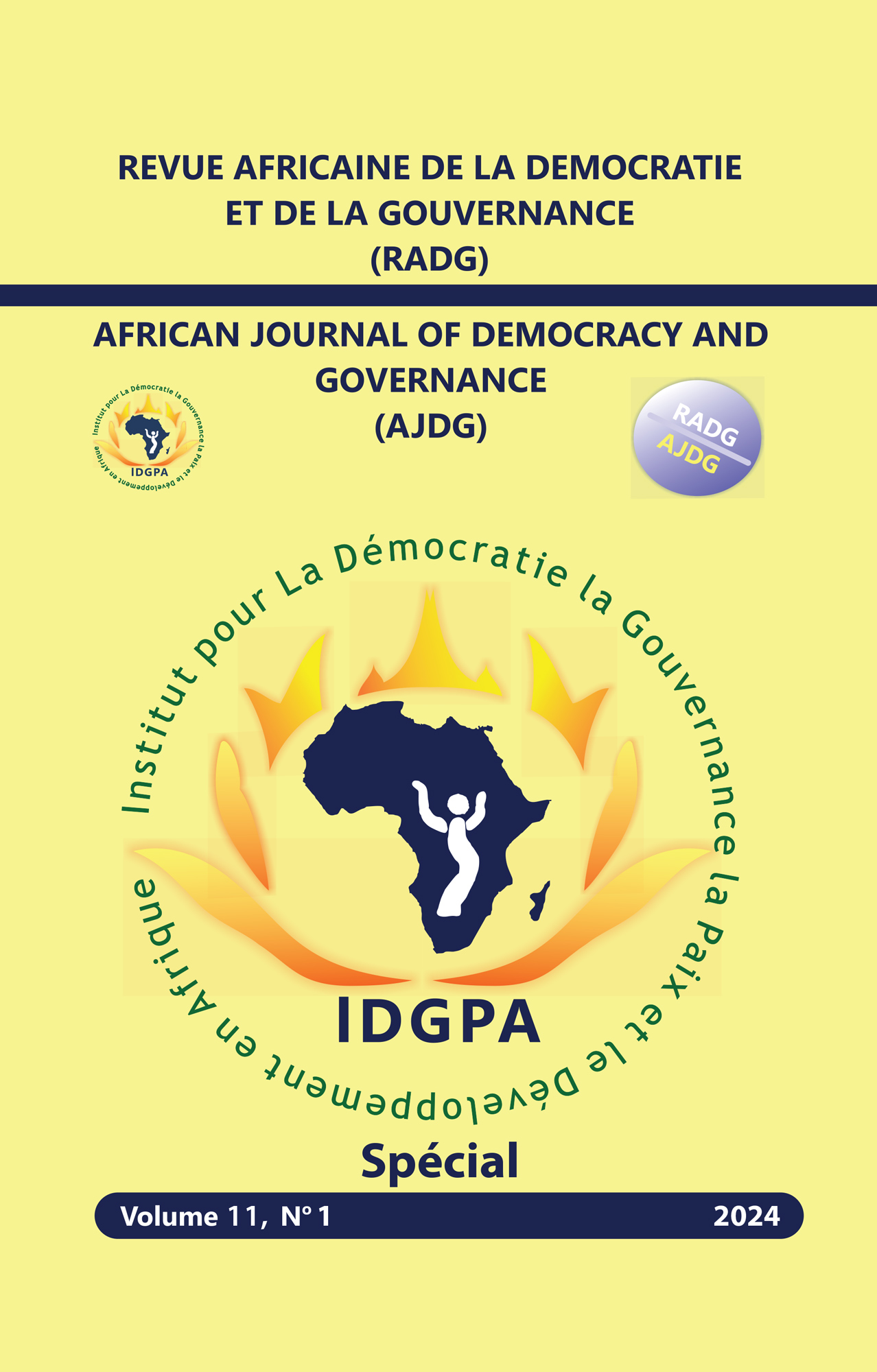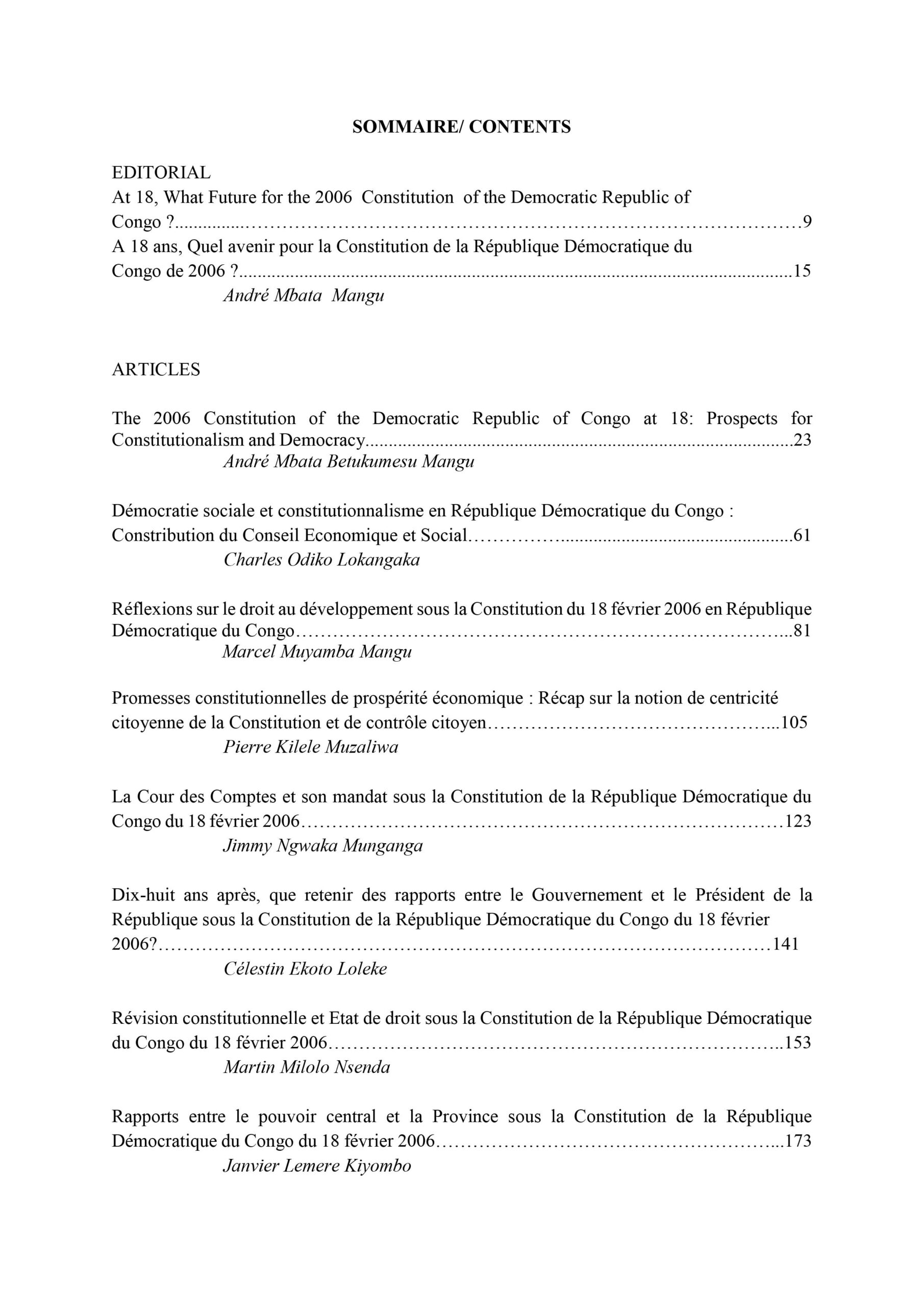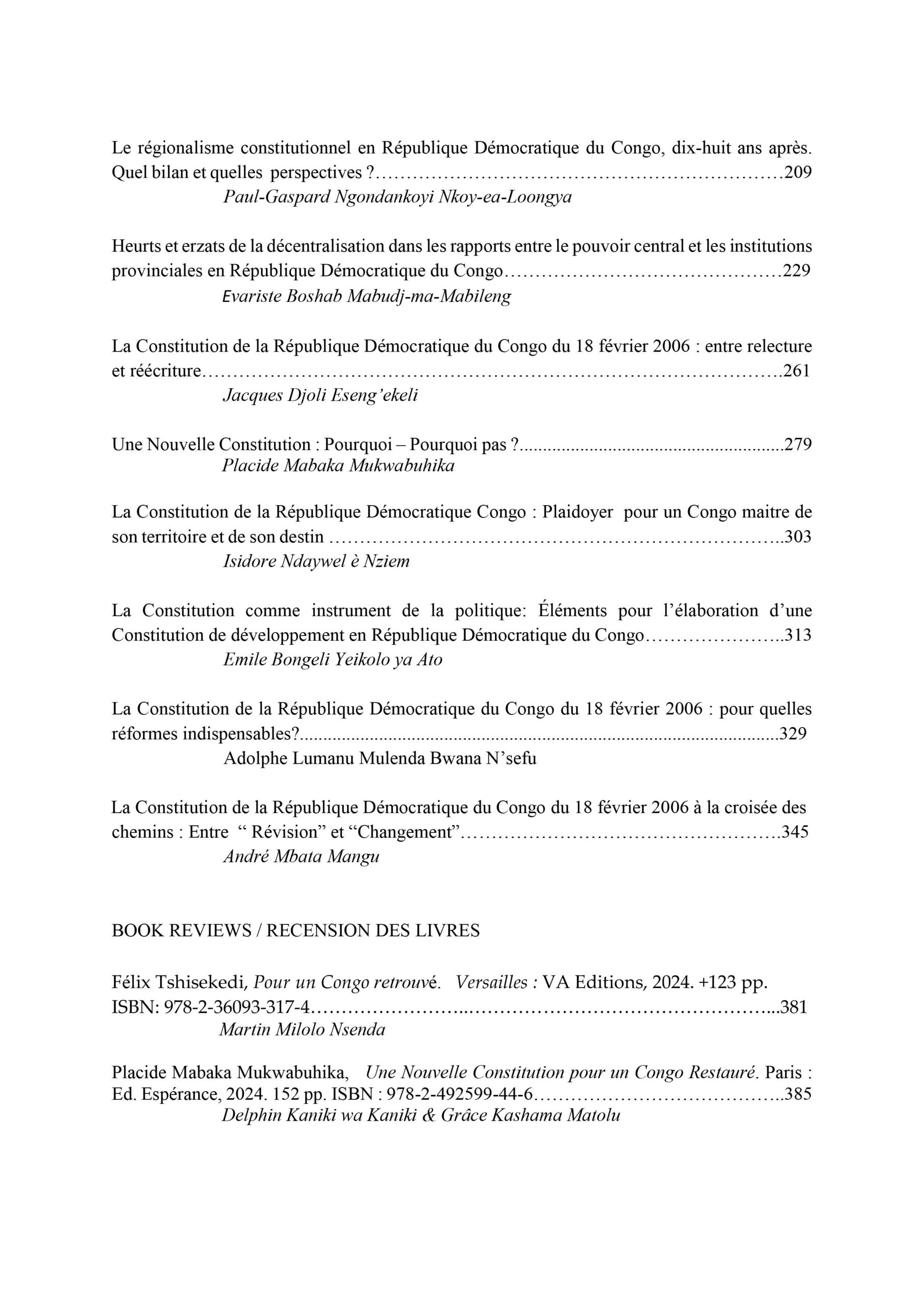The 2006 Constitution of the Democratic Republic of Congo at 18: Prospects for Constitutionalism and Democracy
$ 10,00
Résumé
Le 18 février 2024, la Constitution de la République Démocratique du Congo (RDC) a atteint 18 ans d’existence. Depuis sa promulgation le 18 février 2006, elle n’a connu qu’une seule révision. Au moment où la RDC commémore le 18e anniversaire de sa Constitution, l’article se penche sur cette Constitution, sa place et son importance dans l’histoire constitutionnelle et politique de la RDC, son passé, son présent et ses perspectives d’avenir. L’auteur affirme que comme toute autre oeuvre humaine et en dépit des dispositions intangibles qu’elle peut contenir, aucune constitution n’est parfaite ni éternelle. Elle fait partie du droit positif d’un pays et peut être modifiée. La Constitution organise elle-même sa révision même si elle reste muette sur son remplacement par une autre et dans tous les cas, le changement total est impossible car les nouvelles Constitutions comportent toujours des dispositions héritées des constitutions précédentes, particulièrement celles qui se rapportent à la souveraineté, à l’indépendance, à la démocratie et aux droits de l’homme. A 18 ans, la Constitution de la RDC devrait être adaptée ou ajustée en vue de la consolidation du constitutionnalisme et de la démocratie. « Révision » ou « changement » de la Constitution ? La réponse appartient en définitive au peuple souverain qui gouverne indirectement par ses élus ou directement par voie du référendum.
Abstract
On 18 February 2024, the Constitution of the Democratic Republic of Congo (DRC) was 18 years old. Since its promulgation on 18 February 2006, it has been amended once only. The present article reflects on this Constitution, its place and its importance in the constitutional and political history of the DRC, on its past, its present and its future prospects. The author argues that as any other human creature and despite the provisions that can be entrenched therein, no constitution is perfect or eternal. It is part of the positive law of a country and can be modified. The Constitution provides itself for its amendment even though it remains silent on its replacement by another and anyway, complete change is impossible since new Constitutions always retain some provisions of the previous ones, particularly those related to sovereignty, independence, democracy and human rights. At 18, the DRC Constitution of 18 February 2006 should be adapted in order to consolidate constitutionalism and democracy. Constitutional “revision” or “change”? The final response belongs to the sovereign people who govern indirectly through their elected representatives or directly through a referendum.
Description
Mbata Mangu, A. « The 2006 Constitution of the Democratic Republic of Congo at 18: Prospects for Constitutionalism and Democracy », African Journal of Democracy and Governance, Vol 11, No 1, 2024, pp 23-60
André Mbata Mangu, Extraordinary Professor, College of Law, University of South Africa, South Africa & Professeur Ordinaire, Faculté de Droit, Université de Kinshasa, République Démocratique du Congo
Résumé
Le 18 février 2024, la Constitution de la République Démocratique du Congo (RDC) a atteint 18 ans d’existence. Depuis sa promulgation le 18 février 2006, elle n’a connu qu’une seule révision. Au moment où la RDC commémore le 18e anniversaire de sa Constitution, l’article se penche sur cette Constitution, sa place et son importance dans l’histoire constitutionnelle et politique de la RDC, son passé, son présent et ses perspectives d’avenir. L’auteur affirme que comme toute autre oeuvre humaine et en dépit des dispositions intangibles qu’elle peut contenir, aucune constitution n’est parfaite ni éternelle. Elle fait partie du droit positif d’un pays et peut être modifiée. La Constitution organise elle-même sa révision même si elle reste muette sur son remplacement par une autre et dans tous les cas, le changement total est impossible car les nouvelles Constitutions comportent toujours des dispositions héritées des constitutions précédentes, particulièrement celles qui se rapportent à la souveraineté, à l’indépendance, à la démocratie et aux droits de l’homme. A 18 ans, la Constitution de la RDC devrait être adaptée ou ajustée en vue de la consolidation du constitutionnalisme et de la démocratie. « Révision » ou « changement » de la Constitution ? La réponse appartient en définitive au peuple souverain qui gouverne indirectement par ses élus ou directement par voie du référendum.
Abstract
On 18 February 2024, the Constitution of the Democratic Republic of Congo (DRC) was 18 years old. Since its promulgation on 18 February 2006, it has been amended once only. The present article reflects on this Constitution, its place and its importance in the constitutional and political history of the DRC, on its past, its present and its future prospects. The author argues that as any other human creature and despite the provisions that can be entrenched therein, no constitution is perfect or eternal. It is part of the positive law of a country and can be modified. The Constitution provides itself for its amendment even though it remains silent on its replacement by another and anyway, complete change is impossible since new Constitutions always retain some provisions of the previous ones, particularly those related to sovereignty, independence, democracy and human rights. At 18, the DRC Constitution of 18 February 2006 should be adapted in order to consolidate constitutionalism and democracy. Constitutional “revision” or “change”? The final response belongs to the sovereign people who govern indirectly through their elected representatives or directly through a referendum.
Mots-clés : Article 220 ; Constitution ; Constitutionalism ; Democracy ; Constitutional Amendment or Change; Entrenched Provisions ; Democratic Republic of Congo
Seuls les clients connectés ayant acheté ce produit ont la possibilité de laisser un avis.




Avis
Il n’y a pas encore d’avis.